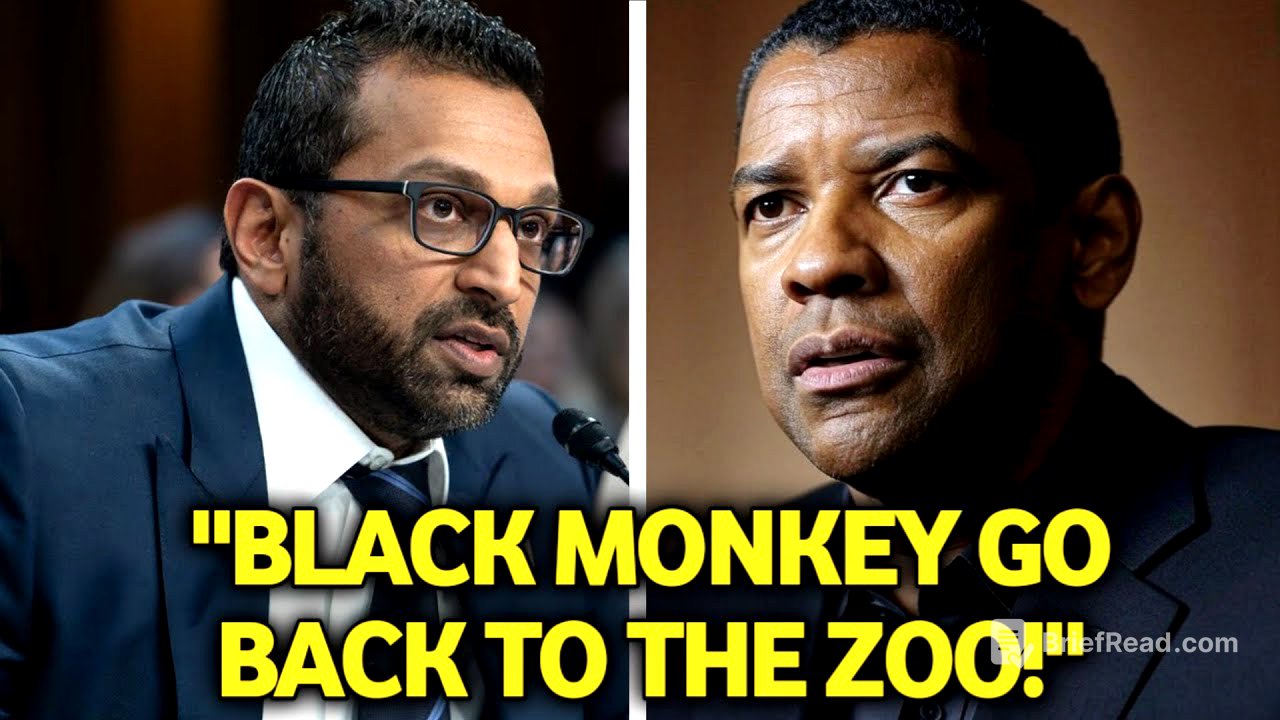TLDR;
This video recounts a tense congressional hearing where Cash Patel attempts to humiliate Denzel Washington but ultimately fails. Washington's calm, fact-based responses and appeals to justice resonate with the audience, exposing Patel's arrogance and lack of genuine concern for the issues at hand. The key takeaways include:
- The power of truth and integrity in the face of arrogance and manipulation.
- The importance of standing up for those who are unheard and unseen.
- The need to prioritize real-world impact and results over political gamesmanship.
Cash Patel's Humiliation Attempt [0:00]
The scene is set in a congressional hearing room, where Cash Patel, a former Trump official, tries to undermine Denzel Washington with condescending questions about his qualifications to be there. Patel questions Washington's background, asking if it was in film makeup or social media branding before he got political, implying he lacks the credibility of those with national security or legal service backgrounds. He further mocks Washington's social media presence, questioning whether he values defending the Constitution or curating his Instagram aesthetic more.
Denzel Washington's Initial Rebuttal [3:26]
Denzel Washington responds to Patel's attacks by calmly outlining his background, including his degree in theater and criminal justice. He highlights his work with families affected by bad policy and his mentorship of young men impacted by the system. Washington contrasts Patel's experience in "back rooms of DC" with his own experience looking men in the eye who had no one left to fight for them. He defends his use of social media to teach and tell the truth, criticizing those who spread disinformation.
Washington Defends His Qualifications [4:50]
Washington addresses Patel's question about his qualifications by detailing his experience questioning witnesses under oath, studying the law, and drafting legislation. He emphasizes that his involvement in these issues extends beyond the public eye, citing instances where outcomes mattered without cameras rolling or applause. He challenges Patel to cite the last time he cross-examined a witness in a courtroom or stood next to someone who needed justice, not for ratings, but for survival.
Patel's Second Attempt to Discredit Washington [6:44]
Cash Patel attempts to regain ground by criticizing Washington's association with criminals and questioning his defense of individuals charged with assault, drug trafficking, and robbery. He accuses Washington of keeping felons on the street and questions his respect for a justice system he once called "rigged theater" in a tweet. Patel tries to portray Washington as someone who cries injustice only when it suits his narrative.
Washington's Response to Patel's Accusations [8:10]
Denzel Washington acknowledges his previous statement that the justice system is rigged, explaining that his view comes from seeing the system's flaws from the inside, such as unequal sentencing for similar crimes based on who can afford better legal representation. He asserts that he is anti-injustice and against a system that punishes poverty more harshly than crime. Washington defends his decision to stand beside those others wouldn't, emphasizing their rights and his oath to uphold them, not for personal gain but because they were people.
The Marbury v. Madison Exchange [11:16]
Patel, in an attempt to undermine Washington's legal knowledge, asks him to discuss the implications of Marbury v. Madison. Washington calmly explains the 1803 Supreme Court decision, which established judicial review. He points out that the case was not just about power but about integrity, balance, and responsibility. Washington accuses Patel of trying to trap him with theory, emphasizing that real-life application and understanding of the law are what protect people.
Washington's Closing Remarks [13:27]
Denzel Washington asserts that he has lived, studied, and practiced law, emphasizing his real-world courtroom experience. He criticizes Patel for using Marbury v. Madison as a trivia question and reminds him of his extensive experience in courtrooms. Washington states that if Patel's best move is to shame people for doing the hard work of justice, he may be distracting from democracy rather than defending it. He acknowledges being underestimated due to his background but asserts that those very qualities qualify him to be there.
The Final Confrontation and Washington's Triumph [15:38]
Denzel Washington accuses Patel of changing the subject and rewriting the rules when facts fail. He reiterates that he is there because the responsibility matters to him and that he speaks from truth, research, and reality. Washington challenges Patel to discuss real-world issues like healthcare affordability and maternal mortality in black communities. He concludes by reminding Patel that power without purpose is just noise and that people are tired of performers in suits who disappear when the real work begins.
The Climax and Denzel's Final Message [19:16]
Denzel Washington responds to Patel's earlier remark to "go back to the zoo" by stating, "We don't cage lions because they're weak. We cage them because they scare people who forgot the wild still has rules." He emphasizes the importance of fighting for one's voice and speaking up even when told not to. Washington concludes by stating that intelligence, merit, and truth always rise above arrogance and manipulation. He encourages viewers to stand for truth and remember that one voice spoken clearly can silence a hundred lies.









